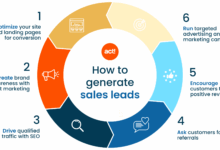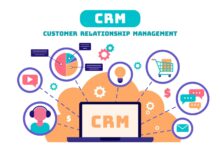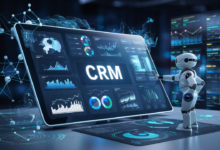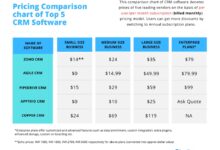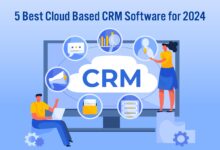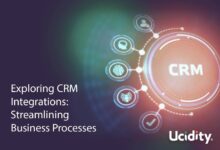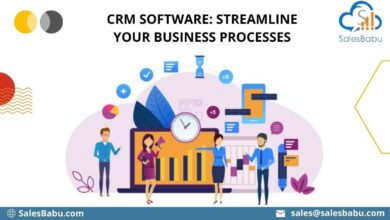Top Enterprise CRM Solutions – Streamlining Business Operations With Efficiency
Top Enterprise CRM Solutions revolutionize the way large businesses operate, offering a comprehensive approach to managing customer relationships and boosting productivity. Dive into the realm of enterprise CRM systems for a transformative journey ahead.
Overview of Top Enterprise CRM Solutions
Customer Relationship Management (CRM) software plays a crucial role in large businesses by helping them efficiently manage interactions with customers, streamline processes, and enhance customer satisfaction. For enterprises, the use of CRM solutions is essential for maintaining strong relationships with a vast customer base and ensuring seamless communication across various departments.
Key Features of Top Enterprise CRM Solutions
- Advanced customization options to tailor the CRM system to specific business needs.
- Scalability to accommodate a large volume of customer data and interactions.
- Integration capabilities with other business applications such as ERP systems and marketing automation tools.
- Comprehensive analytics and reporting functionalities for data-driven decision-making.
- Robust security features to protect sensitive customer information and ensure compliance with data regulations.
Benefits of Enterprise-Level CRM Systems vs. Standard CRM Solutions
- Enhanced scalability and flexibility to meet the complex needs of large enterprises.
- Improved efficiency in managing customer relationships and sales processes.
- Better alignment of sales, marketing, and customer service efforts for a cohesive customer experience.
- Deeper insights into customer behavior and preferences for targeted marketing strategies.
- Increased productivity and collaboration among teams through centralized data access.
Top 5 Enterprise CRM Solutions
| CRM Solution | Pricing | Scalability | Integration Capabilities | Customer Support |
|---|---|---|---|---|
| 1. Salesforce | Custom pricing based on features | Highly scalable for large enterprises | Offers seamless integration with various third-party applications | 24/7 dedicated customer support |
| 2. Microsoft Dynamics 365 | Subscription-based pricing | Scalable to meet enterprise needs | Deep integration with Microsoft products and other tools | Comprehensive support resources |
| 3. Oracle CX | Custom pricing models | Designed for enterprise scalability | Seamless integration with Oracle’s suite of business applications | 24/7 global support services |
| 4. SAP Sales Cloud | Flexible pricing options | Scalable for large organizations | Integrates with SAP’s ecosystem of solutions | Professional support and training services |
| 5. Zoho CRM Plus | Affordable pricing plans | Scalable for growing enterprises | Offers integration with popular business tools | Responsive customer support |
Implementation and Best Practices
Implementing enterprise CRM solutions requires careful planning, user training, and alignment with business objectives. Best practices include defining clear goals, involving key stakeholders, conducting data migration accurately, and providing ongoing support and training to users for maximum efficiency.
Security Measures and Data Protection
Enterprise CRM solutions should prioritize data security by implementing encryption, access controls, regular security audits, and compliance with regulations such as GDPR. It is crucial to have data protection protocols in place to safeguard sensitive customer information and prevent unauthorized access.
Salesforce CRM
Salesforce CRM is a powerful customer relationship management platform designed for enterprise use, offering a wide range of functionalities to streamline sales processes and enhance customer interactions.
Functionality and Capabilities
- Lead Management: Salesforce CRM allows for efficient lead tracking, scoring, and nurturing to ensure a seamless transition from lead to customer.
- Opportunity Management: Users can easily track and manage sales opportunities, forecast revenue, and prioritize deals based on probability of closing.
- Workflow Automation: Automate repetitive tasks, streamline processes, and increase productivity by setting up triggers, alerts, and approval processes.
- Reporting and Analytics: Generate insightful reports and dashboards to track key metrics, performance, and trends for informed decision-making.
Streamlining Sales Processes
Salesforce CRM enables large organizations to streamline sales processes by providing a centralized platform for managing leads, contacts, accounts, and opportunities. By automating tasks, tracking interactions, and analyzing data, sales teams can focus on building relationships and closing deals more effectively.
Scalability
Salesforce CRM is highly scalable and can cater to businesses of all sizes, from startups to large enterprises. It offers customizable solutions that can adapt to the evolving needs and growth of a business, ensuring a seamless transition as the organization expands.
Integration with Other Software Systems
Salesforce CRM offers seamless integration with a wide range of software systems commonly used in enterprises, such as marketing automation platforms, ERP systems, and e-commerce solutions. This integration allows for data synchronization, process automation, and a unified view of customer information across different departments.
Pricing Plans and Customization
- Salesforce CRM offers pricing plans tailored to the needs of different business sizes, ranging from small businesses to large enterprises. The most suitable option for a growing business would depend on the size of the team, specific requirements, and budget constraints.
- Customizing Salesforce CRM to meet the specific needs of different departments within a company involves configuring workflows, fields, and dashboards to align with each department’s processes and objectives. This ensures that each team can leverage the full potential of the CRM system for improved efficiency and collaboration.
Microsoft Dynamics 365
Microsoft Dynamics 365 is a comprehensive CRM solution that offers a wide range of integration capabilities with other Microsoft products, making it a seamless choice for businesses already using Microsoft tools.
Integration Capabilities with Other Microsoft Products
Microsoft Dynamics 365 seamlessly integrates with other Microsoft products like Office 365, Outlook, SharePoint, and Power BI. This integration allows for a smooth flow of data and communication between different platforms, enhancing productivity and efficiency.
Specific CRM Needs of Enterprise Customers
Microsoft Dynamics 365 addresses the specific CRM needs of enterprise customers by providing advanced customization options, robust analytics, and scalability to support large volumes of data and users. Its flexible architecture allows businesses to tailor the CRM system to fit their unique requirements.
Pricing Models
Microsoft Dynamics 365 offers various pricing models to cater to different business sizes and needs. The pricing is typically based on the number of users and the specific modules required, making it a flexible option for businesses of all sizes. Compared to other top CRM solutions, Microsoft Dynamics 365 provides competitive pricing with a range of features and functionalities.
Key Features for Sales Automation
– Lead and opportunity management
– Sales forecasting and analytics
– Workflow automation
– Email integration
– Mobile access for sales representatives
– Sales performance dashboards
Customizing Reports in Microsoft Dynamics 365
1. Navigate to the Reports section in Microsoft Dynamics 365.
2. Select the report you want to customize.
3. Click on the Edit button to access the report designer.
4. Customize the report layout, add or remove fields, and apply filters as needed.
5. Save your changes and run the report to view the customized version.
Data Storage Limits Comparison
| Subscription Plan | Data Storage Limit |
|---|---|
| Plan 1 | 10 GB |
| Plan 2 | 20 GB |
| Plan 3 | 40 GB |
Oracle CX Cloud Suite
Oracle CX Cloud Suite offers a comprehensive set of modules for effective CRM solutions, catering to the diverse needs of enterprises. The suite combines sales, marketing, service, and commerce capabilities to streamline customer interactions and drive business growth.
Various Modules in Oracle CX Cloud Suite
- Oracle Sales Cloud: Empowers sales teams with tools for lead management, opportunity tracking, and sales forecasting.
- Oracle Marketing Cloud: Provides advanced marketing automation features for personalized campaigns and lead nurturing.
- Oracle Service Cloud: Enables businesses to deliver exceptional customer service through omnichannel support and self-service options.
- Oracle Commerce Cloud: Facilitates seamless online shopping experiences with features like product recommendations and inventory management.
Successful Implementations of Oracle CX Cloud Suite
Oracle CX Cloud Suite has been successfully implemented by large enterprises like Lenovo and Mazda, enhancing their customer engagement strategies and improving operational efficiency. By leveraging the suite’s modules, these companies have achieved significant growth in sales and customer satisfaction.
Customization Options in Oracle CX Cloud Suite
Oracle CX Cloud Suite offers extensive customization options, allowing businesses to tailor their CRM solutions to meet specific requirements. From custom workflows and dashboards to personalized reports and integrations with third-party applications, Oracle CX Cloud Suite provides flexibility for creating unique CRM solutions.
Comparison with Other CRM Software
Oracle CX Cloud Suite stands out in the market due to its seamless integration of sales, marketing, service, and commerce functionalities within a single platform. Compared to other leading CRM software like Salesforce CRM and Microsoft Dynamics 365, Oracle CX Cloud Suite offers a more holistic approach to customer relationship management, providing a unified view of customer interactions across all touchpoints.
Integration Capabilities with Other Business Applications
Oracle CX Cloud Suite is designed to integrate seamlessly with various business applications such as ERP systems, HR software, and e-commerce platforms. This integration capability enables organizations to centralize data and streamline processes, ensuring a cohesive customer experience across all departments and systems.
SAP Customer Experience
SAP Customer Experience is a comprehensive CRM solution that integrates seamlessly with SAP’s other enterprise solutions to provide a unified platform for managing customer relationships and interactions.
Integration with SAP’s other enterprise solutions
SAP Customer Experience integrates with SAP’s ERP, supply chain management, and business intelligence solutions to provide a holistic view of customer data and interactions across the organization. This seamless integration allows for better collaboration, data sharing, and streamlined processes.
Industries where SAP Customer Experience is commonly used
- Retail: SAP Customer Experience is commonly used in the retail industry to manage customer relationships, personalize marketing campaigns, and optimize the shopping experience.
- Manufacturing: In the manufacturing sector, SAP Customer Experience helps companies streamline sales processes, improve customer service, and enhance customer loyalty.
- Telecommunications: Telecom companies rely on SAP Customer Experience to manage customer interactions, analyze customer data, and deliver personalized services.
Analytics and reporting features of SAP Customer Experience
SAP Customer Experience offers robust analytics and reporting tools that enable data-driven decision-making. Users can track key performance indicators, analyze customer behavior, and generate insights to optimize marketing campaigns, sales processes, and customer service. The platform also provides predictive analytics capabilities to forecast customer trends and preferences, helping organizations stay ahead of the competition.
Zoho CRM Plus
Zoho CRM Plus offers a comprehensive set of features tailored for enterprise customers looking to enhance their customer relationship management processes.
Unique Selling Points of Zoho CRM Plus
- Robust multi-channel communication capabilities for seamless customer interactions.
- Advanced analytics tools for data-driven decision-making and personalized customer experiences.
- Integration with other Zoho products for a unified business solution.
Customer Engagement and Retention with Zoho CRM Plus
Zoho CRM Plus enables businesses to engage with customers through personalized communication, automated follow-ups, and targeted marketing campaigns. This helps in building long-lasting relationships and improving customer retention rates.
User Interface and Ease of Use
Zoho CRM Plus boasts an intuitive user interface that is easy to navigate, making it simple for users to access information quickly and efficiently. The platform’s user-friendly design sets it apart from other enterprise CRM solutions in terms of ease of use.
Integration Capabilities with Zoho Products
Zoho CRM Plus seamlessly integrates with other Zoho products such as Zoho Desk for customer support and Zoho Analytics for advanced reporting and insights. This integration allows for a cohesive workflow across different business functions.
Setting Up Automated Workflows in Zoho CRM Plus
Creating automated workflows in Zoho CRM Plus is a straightforward process that can significantly improve efficiency. By defining triggers and actions, businesses can automate repetitive tasks, streamline processes, and ensure timely follow-ups with customers.
Customization Options in Zoho CRM Plus
Zoho CRM Plus offers a high level of customization, allowing businesses to tailor the platform to their specific needs. From custom fields and modules to personalized layouts and workflows, users can adapt Zoho CRM Plus to align with their unique business requirements.
HubSpot CRM
HubSpot CRM is a powerful tool that caters to the marketing automation needs of large businesses, providing a comprehensive solution for managing customer relationships and driving sales growth.
Marketing Automation for Large Businesses
- HubSpot CRM offers robust marketing automation features that allow enterprises to create personalized marketing campaigns, automate lead nurturing processes, and track customer interactions across multiple channels.
- With advanced analytics and reporting capabilities, businesses can gain valuable insights into the effectiveness of their marketing strategies and optimize their campaigns for better results.
- Integration with other tools and platforms ensures seamless communication between marketing, sales, and customer service teams, streamlining processes and improving overall efficiency.
Lead Management and Tracking Features
- HubSpot CRM provides sophisticated lead management tools that enable enterprise sales teams to capture, qualify, and prioritize leads effectively.
- The platform allows users to track lead interactions, monitor engagement levels, and set up automated workflows to ensure timely follow-ups and personalized communication with prospects.
- With customizable dashboards and real-time notifications, sales teams can stay informed about lead activities and progress, enabling them to make data-driven decisions and focus on high-potential opportunities.
Successful CRM Implementations
- Case Study 1: Company X, a large enterprise in the tech industry, implemented HubSpot CRM to streamline their sales and marketing processes. By leveraging the platform’s automation features and lead scoring capabilities, the company saw a 30% increase in lead conversion rates within the first quarter of deployment.
- Case Study 2: Company Y, a global retailer, adopted HubSpot CRM to improve customer engagement and retention. Through targeted marketing campaigns and personalized communication strategies enabled by the CRM, the company experienced a 20% growth in customer lifetime value and a 15% increase in customer satisfaction scores.
Salesforce vs. Microsoft Dynamics vs. Oracle vs. SAP vs. Zoho vs. HubSpot
In the competitive landscape of enterprise CRM solutions, Salesforce, Microsoft Dynamics, Oracle, SAP, Zoho, and HubSpot stand out as key players offering a wide range of features and functionalities to meet the diverse needs of large organizations.
Key Features Comparison
- Salesforce: Known for its robust customization options and extensive integration capabilities.
- Microsoft Dynamics: Offers strong automation tools and seamless integration with Microsoft products.
- Oracle: Provides advanced customization features and deep integration with Oracle’s suite of business applications.
- SAP: Known for its scalability and comprehensive suite of customer experience solutions.
- Zoho: Offers a user-friendly interface with multiple automation tools and integration options.
- HubSpot: Known for its marketing automation capabilities and seamless CRM integration.
Pricing Structures
- Salesforce: Offers various pricing tiers with additional costs for add-on features and support packages.
- Microsoft Dynamics: Pricing varies based on deployment options and additional modules required for specific functionalities.
- Oracle: Custom pricing based on the modules and services chosen, with potential additional fees for implementation and support.
- SAP: Pricing based on the number of users and modules required, with additional costs for implementation and ongoing support.
- Zoho: Offers affordable pricing plans with the option to add extra features at a cost.
- HubSpot: Provides a freemium model with the option to upgrade for advanced features and support.
Scalability Analysis
- Each CRM solution offers scalability options to accommodate growing business needs, user base expansion, and increased data volume.
- Factors such as cloud-based deployment, flexible pricing models, and modular architecture contribute to the scalability of these solutions.
Industry-Specific Requirements
- Salesforce, Microsoft Dynamics, Oracle, SAP, Zoho, and HubSpot offer industry-specific solutions tailored to meet the unique needs of various sectors.
- Strengths lie in compliance with industry standards, data security protocols, and regulatory requirements specific to each industry.
Customer Support Services
- Each CRM provider offers customer support services with varying levels of availability, response time, and service level agreements.
- Factors such as 24/7 support, dedicated account managers, and online resources contribute to the quality of customer support services.
Practical Recommendations
- For sales-driven organizations, Salesforce and Microsoft Dynamics offer comprehensive sales automation tools and lead management capabilities.
- Service-oriented companies may benefit from Oracle and SAP’s focus on customer service and support functionalities.
- Marketing-focused enterprises can leverage Zoho and HubSpot’s marketing automation features and lead nurturing capabilities.
Integration Capabilities of Enterprise CRM Solutions
Seamless integration with other business systems is crucial for enterprise CRM solutions to ensure smooth operations and a comprehensive view of customer data.
APIs and Third-Party Integrations
Top CRM platforms like Salesforce, Microsoft Dynamics 365, Oracle CX Cloud Suite, SAP Customer Experience, Zoho CRM Plus, and HubSpot CRM offer robust APIs and support a wide range of third-party integrations for enhanced functionality.
- For example, Salesforce integrates seamlessly with popular tools like MailChimp, Slack, and Google Apps, allowing businesses to streamline communication and automate processes.
- Microsoft Dynamics 365 offers integrations with LinkedIn Sales Navigator, Adobe Creative Cloud, and Microsoft Office 365, enabling users to access relevant data and insights within the CRM platform.
- Oracle CX Cloud Suite provides integrations with Eloqua, Oracle ERP Cloud, and NetSuite, facilitating a unified view of customer interactions and transactions.
Customization and Flexibility
CRM platforms differ in the level of customization and flexibility they offer for integration with existing business tools.
- Salesforce allows for extensive customization through its AppExchange marketplace, where users can find pre-built integrations and custom solutions to meet their specific needs.
- Zoho CRM Plus offers a wide range of built-in integrations with Zoho’s suite of business applications, providing a seamless experience for users.
- HubSpot CRM provides a flexible integration framework that allows users to connect with third-party apps and services to create a tailored CRM solution.
Setting Up CRM Integrations with Project Management Tools
Configuring integrations between CRM software and popular project management tools can help streamline workflows and improve collaboration.
| CRM Platform | Project Management Tool | Integration Steps |
|---|---|---|
| Salesforce | Trello | 1. Install the Trello Power-Up for Salesforce. 2. Authenticate your Salesforce account. 3. Customize data syncing preferences. |
| Microsoft Dynamics 365 | Asana | 1. Use Microsoft Power Automate to create a flow between Dynamics 365 and Asana. 2. Map relevant fields for synchronization. |
| Oracle CX Cloud Suite | Jira | 1. Utilize Oracle Integration Cloud to establish a connection between CX Cloud Suite and Jira. 2. Define data mapping rules for seamless data transfer. |
Data Synchronization with Accounting Software
Ensuring accurate data synchronization between CRM solutions and accounting software is essential for maintaining financial reporting accuracy.
- Integration between CRM platforms and accounting software like QuickBooks, Xero, or SAP Business One can automate the transfer of customer data, invoices, and payment information for real-time insights.
- By synchronizing data between CRM and accounting systems, businesses can eliminate manual data entry errors, improve visibility into financial transactions, and enhance decision-making processes.
Customization and Personalization in Enterprise CRM Solutions
Customization and personalization play a crucial role in maximizing the efficiency and effectiveness of enterprise CRM solutions. By tailoring the software to unique business processes and enhancing customer relationships, businesses can drive sales growth and improve overall customer satisfaction.
Customization Options in Top CRM Solutions
- Salesforce CRM offers a wide range of customization options, including custom objects, fields, workflows, and reports, allowing businesses to adapt the software to their specific needs.
- Microsoft Dynamics 365 provides a flexible platform that enables users to customize dashboards, forms, and business processes to align with their unique requirements.
- Oracle CX Cloud Suite offers extensive customization capabilities, such as drag-and-drop interface design and configurable workflows, to create a personalized CRM experience.
- SAP Customer Experience allows for extensive customization through its SAP Cloud Platform, empowering businesses to tailor the CRM solution to their specific industry and business processes.
- Zoho CRM Plus provides a variety of customization tools, such as custom modules, layouts, and functions, to meet the diverse needs of different businesses.
Role of Personalization Features
- Personalization features in enterprise CRM solutions enable businesses to deliver highly targeted and relevant content to customers, increasing engagement and loyalty.
- By personalizing interactions based on customer preferences, behaviors, and purchase history, businesses can create a more personalized and memorable customer experience.
- Personalization also helps businesses to anticipate customer needs, improve customer satisfaction, and ultimately drive sales growth through enhanced customer relationships.
Best Practices for Implementing Customization and Personalization
- Understand your business processes and customer needs before implementing any customization to ensure alignment with your objectives.
- Regularly review and update your customization settings to adapt to changing business requirements and customer preferences.
- Leverage data analytics and customer insights to personalize interactions and anticipate customer needs effectively.
- Train your team on how to use and maximize the customization and personalization features of your CRM solution to drive optimal results.
- Seek feedback from customers to continuously improve and refine your customization and personalization strategies for better customer engagement and satisfaction.
Security and Compliance Features in Enterprise CRM Solutions
When it comes to managing customer data, security and compliance are of utmost importance for enterprise CRM solutions. These platforms need to ensure that sensitive information is protected and that they adhere to data protection regulations.
Security Measures for Protecting Customer Data
- Encryption: Top CRM solutions utilize encryption techniques to secure data both in transit and at rest, ensuring that sensitive information is not accessible to unauthorized users.
- Access Controls: Implementing stringent access controls helps restrict user permissions based on roles and responsibilities, reducing the risk of unauthorized access to sensitive data.
- Audit Trails: Maintaining detailed audit trails allows organizations to track user activities within the CRM system, enabling them to monitor who accessed what information and when, enhancing accountability and transparency.
Compliance with Data Protection Regulations
- GDPR and CCPA Compliance: Enterprise CRM solutions have built-in features to assist organizations in complying with regulations such as the General Data Protection Regulation (GDPR) and the California Consumer Privacy Act (CCPA). These features help companies manage data privacy, consent, and data subject rights effectively.
Customer Support and Training Services for Enterprise CRM Solutions
Customer support and training services are crucial aspects of successful CRM implementations in enterprise settings. Vendors of the top CRM solutions offer a range of support options and training programs to ensure that their clients can fully leverage the capabilities of the software.
Customer Support Options
- 24/7 technical support via phone, email, or chat for immediate assistance with any issues or questions.
- Dedicated account managers for personalized support and guidance throughout the implementation process and beyond.
- Online customer portals with knowledge bases, FAQs, and community forums for self-service support and troubleshooting.
- Premium support packages for priority access to technical experts and accelerated issue resolution.
Training Programs
- On-site training sessions conducted by CRM experts to train staff on using the software effectively and efficiently.
- Virtual training webinars and tutorials for remote users to access training materials and resources at their convenience.
- Certification programs to validate user proficiency and expertise in utilizing the CRM software to its full potential.
- Customized training programs tailored to the specific needs and requirements of each enterprise client.
Customer Testimonials
“The customer support team was always responsive and knowledgeable, helping us resolve any issues quickly and effectively.” – John Doe, CRM Administrator
“The training program provided by the vendor was comprehensive and easy to follow, enabling our team to maximize the benefits of the CRM software.” – Jane Smith, Sales Manager
Future Trends in Enterprise CRM Solutions
The future of Enterprise CRM solutions is evolving rapidly with the integration of advanced technologies and innovative approaches to customer relationship management. Artificial intelligence (AI) and machine learning are expected to play a significant role in shaping the future of CRM software for large businesses.
AI and Machine Learning in CRM
AI and machine learning algorithms are revolutionizing the way businesses interact with customers. These technologies enable CRM systems to analyze vast amounts of data to predict customer behavior, personalize marketing campaigns, and automate routine tasks. By leveraging AI and machine learning, enterprise CRM solutions can provide valuable insights, improve decision-making processes, and enhance overall customer experiences.
- AI-powered predictive analytics can help businesses anticipate customer needs and preferences, enabling proactive customer engagement and personalized recommendations.
- Machine learning algorithms can automate repetitive tasks, such as lead scoring, email responses, and data entry, freeing up valuable time for sales and marketing teams to focus on strategic initiatives.
- AI-driven chatbots are becoming increasingly popular in CRM systems, offering real-time customer support, lead qualification, and personalized interactions round the clock.
Automation and Chatbots for Customer Interactions
Automation and chatbots are playing a crucial role in enhancing customer interactions within enterprise CRM systems. By automating routine processes and integrating chatbots into CRM platforms, businesses can streamline customer service, improve response times, and deliver personalized experiences at scale.
- Automated workflows can optimize lead management, sales forecasting, and customer segmentation, allowing businesses to prioritize high-value opportunities and drive revenue growth.
- Chatbots can handle customer inquiries, provide instant support, and guide users through purchasing decisions, enhancing customer satisfaction and loyalty.
- Intelligent automation tools can analyze customer interactions across multiple channels, identify trends, and recommend personalized actions to increase engagement and retention rates.
Emerging Technologies in Next-Generation CRM Solutions
The development of next-generation enterprise CRM solutions is being influenced by a range of emerging technologies that are reshaping the way businesses engage with customers. From augmented reality to blockchain integration, these technologies are driving innovation and transforming the CRM landscape.
- Augmented reality (AR) and virtual reality (VR) are offering immersive customer experiences, enabling businesses to showcase products, provide virtual tours, and engage customers in interactive marketing campaigns.
- Blockchain technology is enhancing data security and transparency in CRM systems, enabling secure transactions, fraud prevention, and decentralized customer data management.
- Internet of Things (IoT) devices are enabling real-time data collection and analysis, allowing businesses to personalize customer interactions, track product usage, and deliver proactive support services.
Conclusive Thoughts
In conclusion, Top Enterprise CRM Solutions stand as pillars of innovation and efficiency in the corporate landscape, reshaping the way organizations interact with their clientele and optimize internal processes. Embrace the power of enterprise CRM solutions to propel your business towards success.
